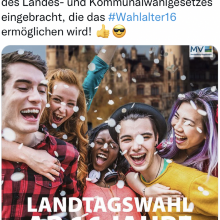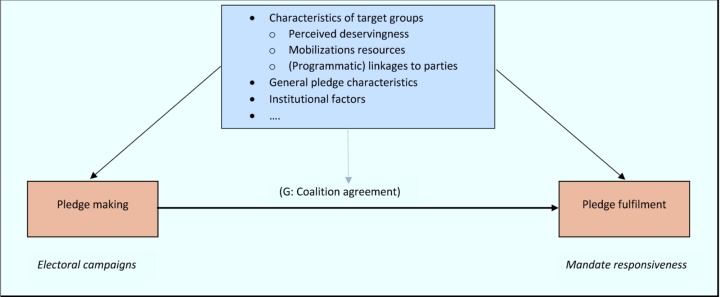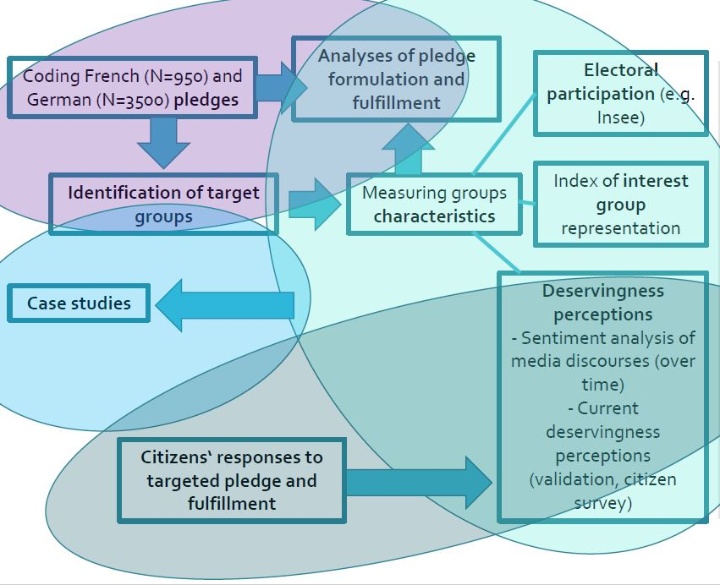Project title:
Unequal mandate responsiveness? How electoral promises and their realizations target groups in France and Germany (UNEQUALMAND)
Duration:
07/2022 – 06/2025
Principal investigators:
Dr. Elisa Deiss-Helbig
Dr. Isabelle Guinaudeau (CEE, Sciences Po)
JProf. Dr. Theres Matthieß (Universität Trier)
Short description:
By looking at France and Germany, UNEQUALMAND analyzes political (in)equalities at different stages of the policymaking process. Focusing on pledge making and pledge fulfillment, we examine political (in)equalities through the lens of group representation. We look at the supply and the demand-side of political competition. Which groups receive electoral promises and for whom are promises fulfilled? What role do the mobilization resources and the social image of these groups play in this process? How and under what conditions do citizens respond to group targeting in electoral manifestos (prospective) and pledge fulfillment (retrospective)? These questions are addressed using an innovative research design that combines data on electoral pledges, population surveys, experimental designs, and case studies. The project is based at the University of Stuttgart, University of Trier and Sciences Po.
Political equality is a core requirement and a key principle of democracy. However, research casts serious doubt on the realization of this ideal and points to “unequal responsiveness”. This project examines political (in)equality in France and Germany at the different stages of the policymaking process. We trace inequalities in the political representation of groups by focusing on electoral mandates (electoral pledges) and their realization in the form of policies.
We look at the supply and the demand-side of political competition. On the supply-side, we argue that groups with strong mobilization resources and a positive social image are expected to be disproportionately targeted in pledges and enacted policy. Moreover, we hypothesize that social constructions may matter most during electoral campaigns (pledge making), while mobilization resources could be prevalent in routine policymaking (pledge fulfillment). On the demand-side, we argue that group-based heuristics and the moderating role of the ambiguity of the pledge influence citizens’ perceptions and evaluation of electoral promises.
By examining the following research questions using a mixed-methods research design, UNEQUALMAND makes an important contribution not only to the literature on unequal responsiveness, but also to previous research on public policy, party competition and electoral pledges:
- Which groups receive electoral promises and for whom are promises fulfilled? What role do the mobilization resources and the social image of these groups play in this process?
- How and under what conditions do citizens respond to group targeting in electoral manifestos (prospective) and pledge fulfillment (retrospective)?
UNEQUALMAND draws on a mixed-method research design combining hypothesis-testing with more inductive approaches that are relevant to an emerging research agenda. To study which social groups are targeted in electoral campaign by political parties (Germany) and (presidential) candidates (France) and for whom promises are fulfilled, we gather (WP1) quantitative data on promises in electoral manifestos and their realization (period: 1995/98 – 2021/22). This workpackage (WP) also includes the identification and the coding of the groups that are implicitly or explicitly targeted in electoral pledges (inductive approach) as well as of a number of further pledge characteristics. We additionally collect (WP2) data on the group characteristics relevant to our theoretical expectations for the period 1995/98-2021/22: mobilization resources (electoral participation, political power) and social image (deservingness perceptions). We use these data (WP1 and WP2), first, to generate a typology on groups and their characteristics (mobilization resources, social image), and then test our hypotheses. Second, the data on pledges are used to design (WP3) two population surveys (with survey experiments) that will be conducted in spring 2023 in France (by the end of the first year) and in fall 2023 in Germany (at the halfway point of the government period) and which will analyze the perception and evaluation of electoral promises by voters. Qualitative process-tracing of cases of (non-)fulfilled pledges targeted at specific groups (WP4) shed light on the mechanisms linking groups, pledges and fulfillment, and allow for further hypotheses to be inductively generated.
As soon as there are project-related news (presentations, publications, project milestones,…) they will be listed here.
Elisa Deiss-Helbig
Dr.Research Fellow




